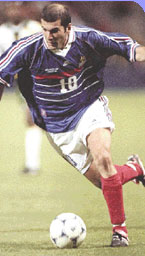|
Leave the 'little' refs alone
By
Tony Becca - On The Boundary
ONE
OF the great things about sport is that it is a level playing field
- an arena in which all men and women are equal regardless of race,
colour or creed, status or influence, the size or the economy of
one's country.
In
other words, sport is the arena in which success depends on performance
and nothing else - the arena in which victory goes to the best and
not to the privileged or the favoured.
Unfortunately,
however, there are those apparently who do not believe that it should
be so - those who believe that sport, big time sport, should be
the playground of big countries.
That
is why in 1998 when Italy were struggling in the qualifying round,
Cesar Maldini, then coach of Italy, questioned the possibility of
a country like Jamaica making it to the finals of the World Cup
and Italy failing to do so, and why on Monday the radio commentators
on duty questioned the presence of Jamaica's Peter Prendergast as
the referee for the Brazil/Belgium round of 16 match.
Early
in the broadcast, one commentator asked another if he did not find
it strange that a referee from a little country like Jamaica was
in charge of a match of such importance, and in his answer, the
other commentator talked about the number of poor decisions throughout
the tournament and blamed it on the amount of assistant referees
from little countries.
According
to him, the mistakes were being made, not by referees but by their
assistants on the lines.
In
the case of Maldini, he probably has learnt his lesson. That may
be why he accepted the job as coach of little Paraguay and hopefully
the commentators on Monday, whoever they are, will also learn theirs
before too long.
Chances
are, however, they may not. They probably are too blinkered, too
snobbish to learn, and that is why they were so pompous why
when there was a delay to take a free-kick, one commentator asked
what was causing the delay and the other responded, "because
Mr. Prendergast says the Brazilian wall is not 10 yards away".
In
football, the big countries include France, Argentina, Italy, Portugal
and Sweden, the little countries include Senegal, America, Japan,
South Korea and Turkey, and if the two commentators were not too
blinkered, if they were not snobs, they would have realised that
like in so many other sports, things have changed in the world of
football.
Things
have changed so much that big France, beaten by little Senegal in
their first finals, failed to get out of the first round, that big
Argentina went home after the first round, that big Portugal were
beaten by little America and by little South Korea and sent packing
after the first round, that little Japan, South Korea and Turkey
made it into the second round.
Also
that Sweden lost to Senegal in the second round, that Senegal, the
US, Turkey and South Korea, who knocked out Italy, are in the quarter-finals,
and that one of them is certain to be in the semi-finals.
Times
have changed, and the big countries, or the voices of the big countries,
should accept that. The criteria to officiate in a World Cup match
must be the ability to do so and nothing else. It is as simple as
that.
The
concern is that those two commentators are apparently not the only
ones who believe that referees from small countries should not officiate
"important" matches, or rather that it should only be
Europeans who are good enough to be given such responsibility.
On
Sunday, in the match between Spain and the Republic of Ireland,
the referee was from Sweden, one of the television commentators
remarked how good it was to see a European in charge, and when the
referee blew for an offside which, according to the replay, was
a good call, he commented on it in a manner to say that a South
American referee would not have been good enough to make the call.
It
was the same commentator who uttered these words later in the match
after the same referee had blown the whistle for a foul and then
looked to his assistant on the line before deciding who had committed
the foul.
"The
referee wasn't quite certain there," said the commentator.
"He knew he had to give something but he did not know who to
give it to. He had to get some help from the assistant on the far
side."
|














